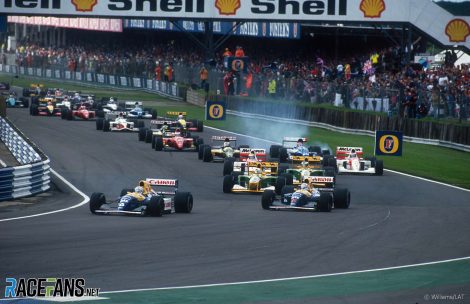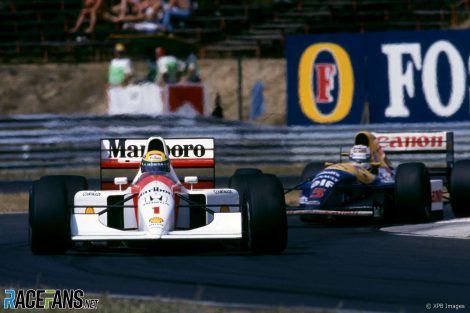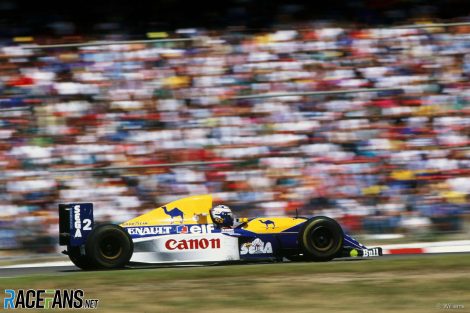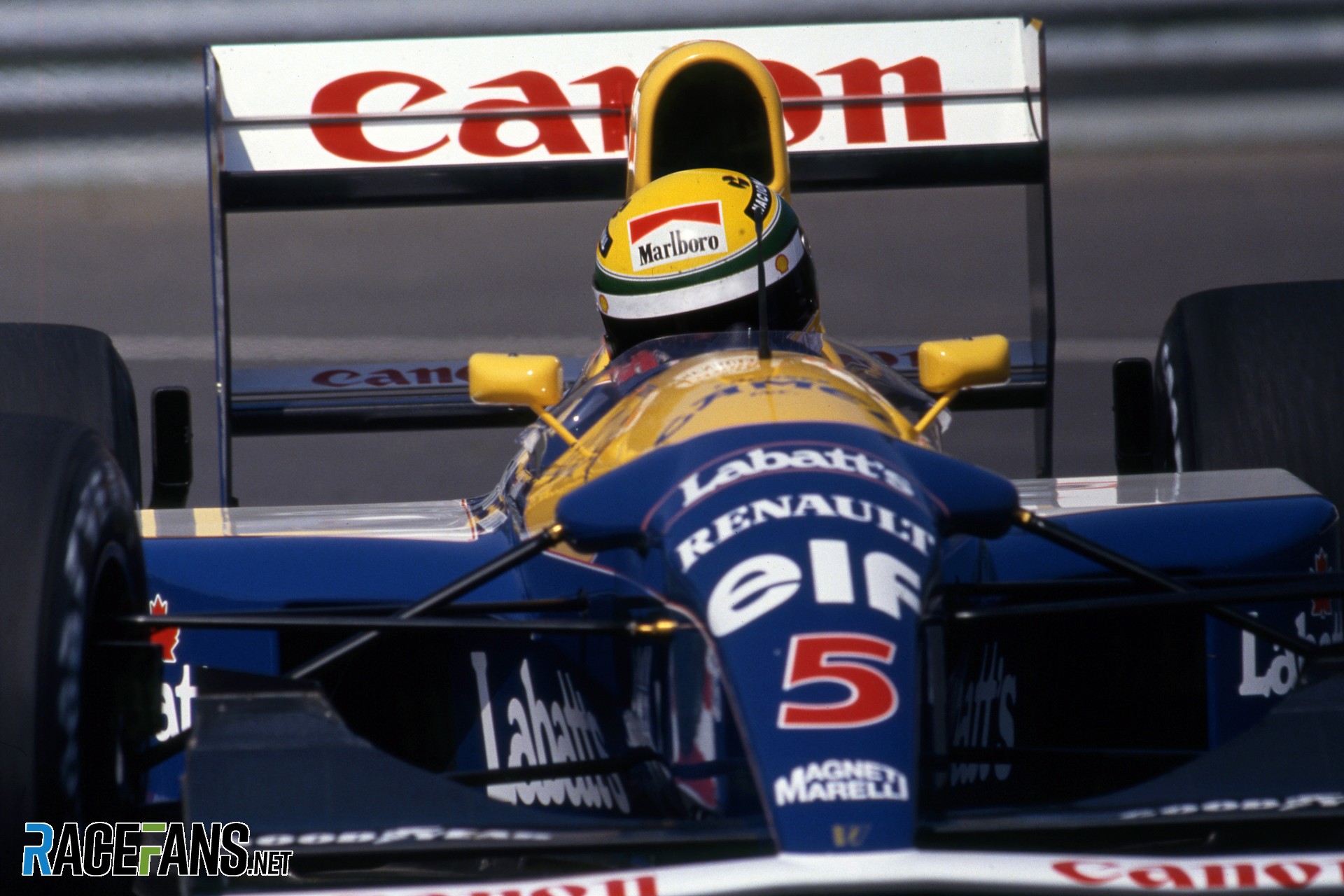Ayrton Senna’s former manager Julian Jakobi revealed earlier this week Formula 1’s most famous driver nearly cut his successful collaboration with McLaren short.
According to Jakobi, Senna turned down a contract offer from Williams in mid-1991, while on course for his third world championship victory with McLaren.History shows a switch to Williams at this point would have been incredibly well-timed. As Senna realised during 1991, McLaren-Honda’s competitive edge was beginning to dull as they headed for their fourth successive sweep of the championship silverware.
Williams were in the ascendancy thanks to their improving Renault engines, superb Adrian Newey-honed aerodynamics, and growing mastery of sophisticated electronic enhancements such as active suspension. Nigel Mansell pushed Senna hard for the 1991 drivers’ title, only succumbing at the penultimate round, while the constructors’ championship fight went down to the final round.
Nonetheless Senna threw his lot in with McLaren for a fifth season in 1992, during which the suddenness of Williams’ ascendancy shocked him and the watching world. McLaren had begun 1991 with four wins in a row, but the following year Williams started with five on the bounce.

Senna made his decision to commit to McLaren at the 1991 Belgian Grand Prix, according to Jakobi. It was a pivotal moment in the championship. Senna had halted Mansell’s winning run at the previous round, and at Spa Honda engine upgrades powered him to pole position at a track where Williams had been expected to excel.
But what would have happened had Senna chosen Williams instead for 1992? And would he have accepted a berth alongside his nemesis and former team mate Alain Prost the following year?
Advert | Become a RaceFans supporter and
1992

Mansell won the title at a canter. Over the first 10 races he won eight times, finished second to Senna at Monaco after pitting due to a suspected puncture, and retired in Canada when he crashed trying to pass the McLaren. Second to Senna in Hungary sealed the title.
There’s little reason to doubt Senna would have achieved any less in Mansell’s car. Particularly given that Mansell began the year in less than top competition, having injured his ankle at the end of the previous year, and his team mate Riccardo Patrese was required to play second fiddle, most notably at the French Grand Prix.
The much more interesting scenario to contemplate is one excluded by Jakobi, who indicated Senna would have taken Mansell’s car: What would have happened had Senna and Mansell been team mates?
Given the acrimony which had passed between the two before, notably their collisions at Brazil in 1986 and Belgium in 1987, it’s no stretch of the imagination to suppose Senna versus Mansell at Williams could have been every bit as spectacular as Senna versus Prost at McLaren.
Advert | Become a RaceFans supporter and
1993

Patrese had already made arrangements to join Benetton when Mansell chose to leave the team rather than accept a place alongside the incoming Prost. Test driver Damon Hill, who had started just two F1 races up to this point, was therefore handed his debut.
Despite Williams still enjoying a significant performance advantage over the competition, Prost didn’t dominate the 1993 season as emphatically as Mansell did the previous year. An inspired Senna, wielding a McLaren now powered by a customer Ford Cosworth engine (and lacking the latest upgrades available only to Benetton), tied Prost 3-3 on wins over the opening six rounds.
The superiority of the Williams-Renault combination told over the balance of the season, and Prost took the title with two races to go (both of which Senna won). As Senna himself made clear at the time, he would have been in a far stronger position had he been driving what was by far the fastest car in the field.
Go ad-free for just £1 per month
>> Find out more and sign up
1994 and beyond

For years we have wondered how much higher those tallies might have been had Senna not much such an untimely end. The realistic possibility he could have been a Williams driver two years earlier, and driven two of the most dominant cars F1 has ever seen, gives pause for thought.
But would it also have changed perceptions of Senna the driver? He is the sport’s most beloved hero, and part of that is bound up in his struggles against the odds in 1992 and 1993, particularly the latter season, when he produced some of his greatest giant-killing feats.
Arguably, if there was ever a drivers whose genius did not require cars as formidable as the FW14B and FW15C, it was Ayrton Senna.
F1 history
- How you rated F1’s 12 sprint races so far – and why two outscored the grand prix
- Alonso set to become F1’s oldest driver for more than 50 years
- From ‘Flying Pig’ to Senna’s heroics: The short, incredible history of Toleman
- From farcical to fantastic: Formula 1’s 14 title-deciding Japanese races ranked
- Benched: The five other drivers who stood down for team mates in last 50 years





HOLMZINI
2nd May 2020, 15:28
Rather hear about the potentials of Nelson Piquet 3x Drivers World Champion and his chances being better for points collecting than the way over the top style of Senna.
Piquet never gets the same attention while being a superior overall driver.
Senna’s God like following has to this very day has mystified me. His constant testing of life n death moments in the car only makes him lucky , not God like. His willingness to get closer to death than his fellow competitors doesn’t make him better than all others just a bit more foolish.
Prost in the end probably the best of both Piquet and Senna, stood up to the Senna driving style and was successful but gave up as Senna sought the edge more often. Most fans failed to see the Train Senna was riding. They love him for for his special talents but reality was he was just lucky most of the time.
Just because Piquet didn’t give a Rats Ass about his press and what was thought about him doesn’t make Senna into some kind of God. Certainly a good driver but there were many other good drivers then.
Senna vs Piquet just what are the statistics between them? It may surprise everybody
HOLMZINI
Tim Lemmens
2nd May 2020, 17:23
You are clearly on the “Piquet is better than Senna”-path. But there are certain elements I do agree with.
I found it quite remarkable Keith uses this phrase: “The realistic possibility he could have been a Williams driver two years earlier, and driven two of the most dominant cars F1 has ever seen” as Senna got 2 of his 3 world titles in what still probably is the most dominant car of F1. His third one wasn’t as dominant, but much more reliable.
I too think Senna was a master in using press and public perception to make him come out better than he really was and his unfortunate death cemented that reputation. I still consider Senna as one of the all time greats, as he might have been the outright fastest of all F1-drivers. But I do agree he had many flaws as wel. Not in the least his proness to crash with other drivers in a race.
He made his own myth during his career, and his death made the myth even bigger. If he’d just gone on to retire, people would probably remember him as they remember Schumacher or Prost.
Jim
3rd July 2020, 1:17
Hill got to within one point of Schumacher in the 1994 WDC.
Senna lapped Hill at just half race distance in the only race they were teammates driving the same car.
There’s your answer who would have won 1994, 1995, 1996 and the 1997 WDC’s.
Darryn Smith (@darryn)
2nd May 2020, 18:20
I think the God like status Senna holds today is simply that he was finally successful at killing himself. Sort of like Villenueve but not quite as intense of a death wish. Villenueve had that God like status before Senna. Senna was far more arrogant and cavalier with other peoples lives though. I guess fans like these tortured souls. I am guessing Senna would have been looked back on more like Piquet if he hadn’t of died. Senna saved himself a period of waning skill and having Schumacher destroy him.
Jose Lopes da Silva
3rd May 2020, 8:37
There’s something few people in England realise: Piquet lost skills permanently after his Tamburello crash. Sounds harsh on Mansell, but there was an immediate drop of performance between the two after that.
Well, maybe Senna had to endure performance losses too, had he survived.
bobec
6th May 2020, 19:22
@darryn Mind explaining exactly how Senna succeeded at getting himself killed? You’re not going to say he was “driving too fast” through flat-out Tamburello, with MS keeping up right behind him, are you? You never know these days, lots of weird things are being said.
Balue (@balue)
3rd May 2020, 9:29
Interesting take with the envelope-pushing. Could well be.
bobec
6th May 2020, 19:26
@HOLMZINI Yeah man, totally. Senna was such a mediocre driver. That’s why every team wanted him. Williams forced Prost to leave the team in 1994 so Senna could join them, with Renault (a French company! ) being a driving force in that.
Eduardo (@goldenboy)
3rd June 2021, 8:29
“Luck” lol. Donington in 93 and Brasil 91 was probably the biggest single performance by a driver.
When did Prost and Piquet do a season similar to Senna in 1993?
Never.
Piquet was a great driver, but very arrogant and never did anything for his country, without charisma.
bren85q
2nd May 2020, 15:44
Keith….. Jakobi was very clearly getting his years mixed up. It would of been for 91 NOT 92. As it was known at the time Williams were talking to Senna, Mansell and Alesi.
I am not sure how people are not seeing this. It was even in Autosport in Aug 90 that Williams were talking to Senna.
anon
2nd May 2020, 17:39
bren85q, there is an Italian expression that perhaps encapsulates the situation – se non è vero, è ben trovato, a phrase which is usually rendered as “even if it is not true, it is a good story”.
As you note, there are aspects about the way that Senna was handling his contract negotiations in 1990 – signing a pre-contract with Ferrari for 1991 and 1992 in mid 1990, for example – that do make it sound more plausible that these talks took place in 1990 and not 1991.
As a ploy to extract more money from McLaren – Ron Dennis has stated Senna was very aggressive when it came to his salary demands, in part because it was a way for Senna to measure his status and importance within a team – having a pre-contract with Ferrari and a contract offer from Williams in mid 1990 would be some very useful bargaining chips to play in negotiations with McLaren, and it would fit with the timeline of Senna having contract talks with McLaren at the time.
However, as perhaps illustrated by this very article, the idea of imagining what might have been is, to many, a rather romantic and appealing prospect, especially in a time when people want escapism from what is happening right now – particularly when it comes to a driver who, with the flood of films and books about him recently, has become increasingly mythologised and almost deified.
Sensord4notbeingafanboi (@peartree)
2nd May 2020, 17:43
he would have raced the better livery, looks good on that header, number looks wrong. Mansell was a great driver, I don’t think it would have mattered, just different.
Damon (@damon)
2nd May 2020, 20:49
Yup, Senna would’ve driven a no. 1 car, being the reigning champion.
Darryn Smith (@darryn)
2nd May 2020, 18:26
Nobody was surprised by Williams’ dominance in ’92. Certainly not Senna. That is a ridiculous statement. Watch ’91 again.
PMccarthy_is_a_legend (@pmccarthy_is_a_legend)
3rd May 2020, 0:17
I remember the 1993 season. Even the British media which wasn’t always kind to Senna realised that we were seeing a genius at work. The whole paddock did.
And I don’t use the word genius lightly. It really was something incredible to watch.
That memory never really left me and to this day I haven’t seen anyone like it since.
MEF
4th May 2020, 12:08
Alonso 2012 is the only performance that comes close.
Jay Menon (@jaymenon10)
3rd May 2020, 2:38
Always interesting to speculate what would have happened had Senna lived.
Would he have beaten Schumacher in 94 and 95? Would he have grown disillusioned and moved to Ferrari after that? Which would have taken a 3 years to win a title with?
He could have quite possibly gone the rest of his career without winning another title.
Darryn Smith (@darryn)
3rd May 2020, 5:58
’94 would have been a good battle. I still feel bad that that never happened.
Jose Lopes da Silva
3rd May 2020, 8:34
The most likely was for him to loose 94 and win the next 3.
If you look with hindsight, you’ll see that Williams had in 1995 two ‘number 2’ drivers. A top driver would probably have been able to beat Schumacher.
bren85q
3rd May 2020, 10:35
I disagree slightly, Williams failings were more due to them in 95 (and 94 actually-Jerez fuel blunder losing Hill the title really) than Damon. Hill made errors later on in the year but without poor reliability Hill would of won the first 3 races, on top of that their strategy and pit stops were woeful. They were giving away 30 seconds a race to Michael on those 2 things alone.
Hill with better reliability would of won: Brazil & Germany and a 5 year old would of made a better job at the strategy in Monaco so he would of won there to. Add DC winning in Belgium potentially. And all of a sudden you have a title race before Damons errors in Europe and Japan.
JMDan (@danmar)
3rd May 2020, 2:50
We’ll never know! :-(
Balue (@balue)
3rd May 2020, 9:34
IMO almost the worst part of F1 is how drivers are measured because of lucking in to cars, but that goes right back to the beginning. Of course it’s more than likely Senna would have racked up several more titles in the Williams and put him on the greatest-ever list, but same could be said about many. Just think if Alonso or Vettel had gone to Mercedes for example. Could already have topped all the lists by now.
Jones
3rd May 2020, 13:12
As Eddie Irvine said, “if my auntie had balls, she’d be my uncle”.
This week’s prize for Whatifery goes to…
Ambrogio Isgro
4th May 2020, 15:45
Senna was just lucky most of the time? You’re serious?
Well, Enzo Ferrari called “Fortunello” (lucky boy), Nelson Piquet, as he never loved him as a driver, and when the brasilian claimed that he had contacts with Maranello to drive for them, he harshly dismissed those claims.
Piquet had a winning title machine at least in 5 seasons from 81 to 87, and he managed to win it three times. Senna had a winning title machine 4 years in a row and he won the title three times and lost it only in 89, against his teammate Prost.
So, they never fight really for the Championship.
When is about statistics, everybody can see Senna and Piquet win and pole position rate. No surprise about who was the best.
Piquet was a great driver, but to say that Senna was one like many others, it’s just a false claim, isn’t it?
Kim Philby (@philby)
4th May 2020, 19:30
Overall I think that best driver ever is Prost with Schumacher a close second and Senna third. Senna’s death immortalized him and there is one statistic about him often overlooked but important non the less. He achieved 65 poles but only 19 fastest laps which for me reveals poor race pace. Destroying the opposition on Saturday and falling into the clutches of Prost on Sunday was a recurring theme. As for his ability in the rain though undoubted came courtesy of constant risk taking.
Darryn Smith (@darryn)
4th May 2020, 20:54
His risk taking in traffic was the only other advantage he had over Prost. At some point you kind of have to rate someone higher in that they also lived through it. I’m sure Prost would have destroyed Senna if he had no regard for life. Like Piquet says when someone asks him about how he rates against Senna, “I’m alive”.
mmertens (@mmertens)
5th May 2020, 12:51
With all due respect, I don’t believe this is true. People tend to highlight his qualifying performances and are quick to point out to the fact that he didn’t have a lot of fastest laps in a race, as this means is an “inconsistent” driver. This is simple not true. Looking thru Senna’s career, he had a pattern where he used to push hard in the beginning stages of a race, when the car had heavy loads of fuel, and after the first 20 laps or so, he will have a cushion against the opponents. He stated that after he had gained at least 3 sec against the 2nd place, he will then drive in a more conservative way, trying to do the same as Fangio did in his time (winning the race going the slowest as possible – Senna also said he tried always to do the same), as at that time fuel consumption (in Turbo era) and reliability were a constant issue. If you see how many times he led a race in the Lotus era and had the race ended due to mechanical issues or fuel issues, you can see how this was important, he was aware or how fragile these cars were, so no pushing needed for fastest. Also, the fact of not having fastest laps in a race doesn’t mean he had poor race pace, he was just very good in managing race pace, and could do almost identical lap times during a race. Gerard Ducarrouge, and Pat Symonds were also impressed about his race pace and capacity of being consistently fast in a race without damaging his machinery. So, as it is today, looking just for fastest lap in a race does not tell if a driver has good race pace or poor race pace, as this seldom shows the big picture and the consistency of a driver, During this covid break, I am having the opportunity to watch every race since 1981 on F1.tv. and you are able to easily see the most consistent and fast drivers, unsurprisingly, the best ones are always there: Prost, Piquet, Lauda and Senna.
Jim
6th June 2020, 5:39
Like afer winning the Monaco GP when Webber said he was proud to be up there with Senna in winning Monaco.
And someone said you’d have to win the next five runnings consecutively just to match him.